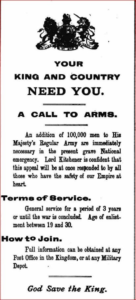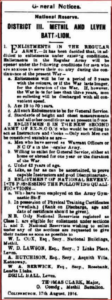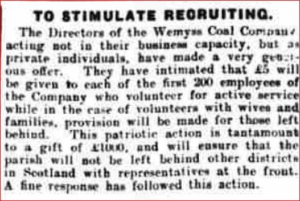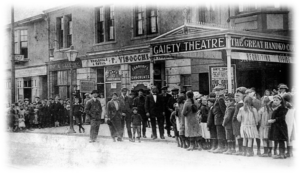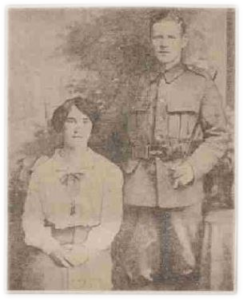In the Summer of 1914 trouble was stirring in Europe. On 24 July, the Austro-Hungarian Government sent an unanswerable ultimatum to the Government of Serbia. Four days later, Austria and Hungary declared war on Serbia on 28 July 1914, and one day later Austrian artillery bombarded Belgrade. The situation escalated rapidly and Europe was soon at war, with Great Britain declaring war on Germany at 23.00 on 4 August 1914.
Kate’s brother and Robert’s brother-in-law, Ralph Pitt, was a regular soldier in the Scots Guards, so he left with the rest of the comparably small regular army force for France and Belgium in late August.
There were rumblings in the mining industry about pay and conditions, and the arrival of war only accentuated the situation. Shipping was under threat and was curtailed; exports to Europe quickly reduced; and mine owners looked at ways to reduce costs and labour as the price of coal would likely slump as demand reduced.
Local men were implored to volunteer for Lord Kitchener’s Army. The first one Hundred thousand would become known as K1. This first advert appeared in in the local Leven Advertiser & Wemyss Gazette on 13 August 1914. The target was young men aged 19-30 for a period of 3 years or until the War was over.
Attr: Newspaper image © The British Library Board. All rights reserved. With thanks to The British Newspaper Archive (www.britishnewspaperarchive.co.uk).
The following week, on 20 August 1914 another advert appeared. This was for a National Reserve that would be raised locally with specific skills and experience being sought.
Attr: Newspaper image © The British Library Board. All rights reserved. With thanks to The British Newspaper Archive (www.britishnewspaperarchive.co.uk).
The pressure mounted for miners throughout Fife. Many families saw their young men join up with Kitchener’s First Volunteer Army. Local companies such as Wemyss Coal Company and Robert Mcalpine & Sons, who were still working on the unfinished docks extension, offered incentives for men to enlist.
A particular example of an incentive was contained in the Minutes of The Wemyss Coal Company Board on 29 August 1914. Agenda Item 8 contained 2 specific and significant items of note:
- -Rents and Fire Coal: Men who have joined the Services to have rent free and coal free both in Company’s and other houses
- -First 200 men to volunteer would receive £5 each to be paid by Board Members from own pockets.
An article in The Leven Advertiser& Wemyss Gazette of 3 September 1914 confirmed that the plan had been approved by The Board.
Attr: Newspaper image © The British Library Board. All rights reserved. With thanks to The British Newspaper Archive (www.britishnewspaperarchive.co.uk).
Further evidence of enhanced recruitment activity was seen when the Gaiety Theatre on Wellesley Road doubled up as a Recruiting Office.
The deteriorating business in the local pits was evidenced at the Wellesley pit in Denbeath in October. After the outbreak of World War I, the Wellesley had only employed 500 men from their previous 1,500 workforce. Those workers who had been kept on were all heads of families, who worked at short notice. The Wemyss Coal Company made the sad decision to close down all operations and the remaining 500 were laid off.
Further evidence of what might come to Denbeath was underlined by offers to create new hospitals for casualties returning home. The Scotsman reported that the Savoy Skating Rink building, behind the Gaiety Theatre, had been offered by the owners, Messrs Campbell and Farmer. They also offered beds along with the Wemyss Coal Company. Local Red Cross societies also lined up to help and many other buildings were put at their disposal.
In the early days and months after war was declared there was a strong message that it would all be over in months. How did that influence thinking at home?
As a newlywed, Robert Dunsire must have experienced various emotions and had challenging conversations with Kate. Denbeath had been a fertile source for recruitment and the proximity of the Recruitment Office at the Gaiety Theatre must have added to the pressures. The ominous news that Kate’s brother was posted missing less than three months after his departure across the Channel must also have created a major dilemma for the young couple. Robert saw friends and workmates enlist. What would he do?
He had many influences in his life that underscored the value of public duty. His friends and colleagues from work had volunteered, some with children. He was a team player and understood danger from his own experiences underground in the pit, but had no understanding of the ravages of war, apart from the string of deaths and casualties reported in local newspapers. However, there were also employment risks with the downturn in demand for coal.
Was this the photograph that Kate wanted to see – Kate posing with her handsome young husband in uniform? Any indecision would soon be resolved.
Attribution: Image © Mirrorpix/Reach Licensing. Image created courtesy of THE BRITISH LIBRARY BOARD.
